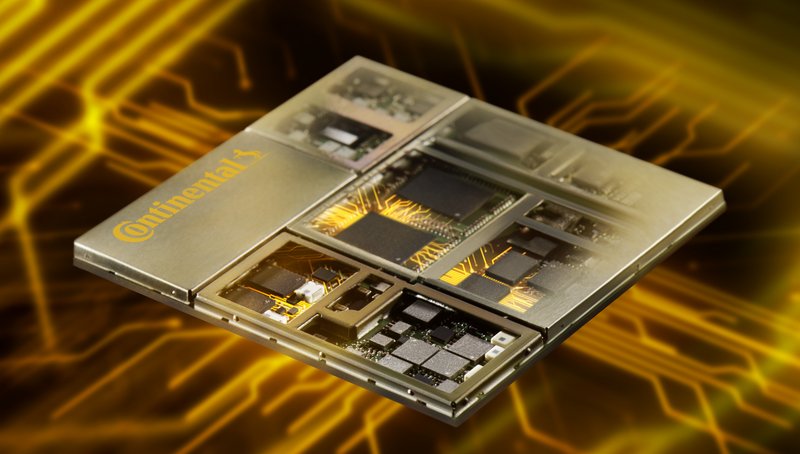High-performance computers – illusory giant or real colossus?
Michels and his technicians work together on new solutions and innovations that can simplify software applications in the vehicle and make them more efficient. That is important, as software is advancing. While only ten percent of functions in a new car were controlled by software in 2013, it is expected that this will rise to 40 percent in 2023. Continental CEO Nikolai Setzer reiterates: “Software is the oxygen of the industry.” “More than 90 percent automotive innovations today already come from software and electronics development,” confirms Michels.
For the industry, software is also a profitable business with valid growth potential: the statistics service Statista predicts strong growth for software in the automotive sector. According to a forecast from 2019, global software sales in the automotive industry will increase from $20 billion in 2020 to more than $50 billion in 2030.
Continental recognized the trend early on and stocked up on capacity such as expertise. As things currently stand, around 20,000 software and IT experts work in Continental’s software powerhouse on software for the next generation of vehicles using the latest methods and some tools that were specially developed for Continental. For the development of ICAS1 alone (a high-performance computer for Volkswagen’s new ID-3 electric car), working hours in the single-digit millions range were invested up to the start of serial production. “In the vehicles that we are now designing, data and functions are centrally managed by intelligent high-performance computers,” explains Michels. Continental is designing various high-performance computers: for advanced driver assistance systems, onboard infotainment, as well as all safety-related vehicle and chassis functions.
These high-performance computers (HPC) fit on a circuit board that is approximately DIN-A4 in size and act as a server that bundles the entire data communication. The data highway over which an HPC communicates in the electronics network is therefore multiple times faster than standard lines. This goes hand in hand with growing data volumes: According to calculations by experts at Continental, the computing power required to be able to process this data quickly or even almost in real time is expected to increase by a factor of 50 per car in the period between 2015 and 2030.
Despite the increased amount of data, the goal of Michels and his team is clear: “To take complexity out of the entire system and to turn the vehicle into a safe smartphone on wheels.” Similar to a cell phone, users can load apps and services of their choice onto the car and easily install new safety and driving functions. Like in an electronic brain, the HPC is the nerve center. Thanks to new server architecture, vehicles are becoming more simple and react faster. That contributes to a greater range of functions and more comfort in the vehicle. And that works, to a large extent, wirelessly over the mobile network or Wi-Fi – without visiting the workshop. Ten Gbit per second will be the new standard for automotive Ethernet. Ultimately, time-critical information can be transferred between vehicles in just a few milliseconds via the 4G or 5G mobile network.
One example shows how new high-performance computers improve a vehicle using software: the ID.3 electric car from Volkswagen. It has two HPCs on board. The body high-performance computer as an in-car application server, which has been dubbed ICAS1, originates from Continental. It manages the range of functions and the data flows in the car and it also locks the data against unauthorized access. The high-performance computer contains approximately 20 million lines of code and enables a whole host of functions in the vehicle. That reduces cable volume and ensures that less installation space is required, reducing costs for the manufacturer while making the vehicle more and more modern. In addition, the HPC allows wireless updates to the software in the entire vehicle – like with a smartphone.
However, the often-cited smartphone comparison has one critical flaw: In the worst-case scenario with a cell phone, you have to restart it. The biggest problem you might have is an app that isn’t working. The risks are more serious in cars, as human life is ultimately at stake. In addition, there are legal regulations that must be complied with. Continental therefore relies on the highest safety standards. Together with Elektrobit (EB) and PlaxidityX (formerly Argus Cyber Security Ltd.), Continental offers multilayered total solutions for maximum cyber security in the vehicle over its entire service life. Driving safety is also important to Continental: “For safety-related issues, speed is not the most pressing goal; we do not make any compromises,” says Dr. Thorsten Köhler, head of Innovation Management at Continental Automotive.
While critics find fault with the capacity of today’s HPCs, the development of the software super-brain is already paying off for Continental. Intelligent high-performance computers have already become real giants for the Group, with current sales of over four billion euros.
Back to software overview.



